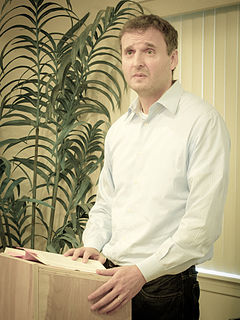A Quote by Elizabeth Warren
Writing laws based on an abstract theory, rather than reality, is a dangerous undertaking.
Related Quotes
Abstract understanding doesn't mean arbitrary sloshing and messing. Abstract art is controlled visual magic based on laws and methodology. Abstraction generally involves implication, suggestion and mystery rather that obvious description. Like a good poem, a good abstraction attacks your feelings before your understanding. Abstraction within realism adds zest and excitement to otherwise dull subject matter. Abstract understanding takes time and patience.
The Western approach to reality is mostly through theory, and theory begins by denying reality - to talk about reality, to go around reality, to catch anything that attracts our sense-intellect and abstract it away from reality itself. Thus philosophy begins by saying that the outside world is not a basic fact, that its existence can be doubted and that every proposition in which the reality of the outside world is affirmed is not an evident proposition but one that needs to be divided, dissected and analyzed. It is to stand consciously aside and try to square a circle.
If you have laws and legislation that ban certain things based on the principles of the Scriptures and based on your Christian background, then let it stand there. Who is having big debates with the Islamic people about it (gay rights)? Who is telling them to bend their laws? If your laws are based on your Christian points of view, then you must stand your ground?
I think it's often easier to theorize in the official codes of theory rather than to theorize lightly through scene, object, story, and incident in ways that keeps alive the sensual serendipities of language. This is not a question of being for or against theory, but rather of being suspicious of orthodoxies that concede, in advance, that what passes for theory must be signaled by a narrowing of diction, sentence rhythms, and sensual awareness. I'm in favor of surprise.
Moral theory develops from the divine command theory of medieval Christian philosophy, mixed up with a bit of ancient pagan virtue theory, to the purely secular moral sentiment and interpersonal reaction theories of Smith and Hume, to Kant's attempt to restore command theory but with something supersensible in the individual rather than God as the source of authority.




































